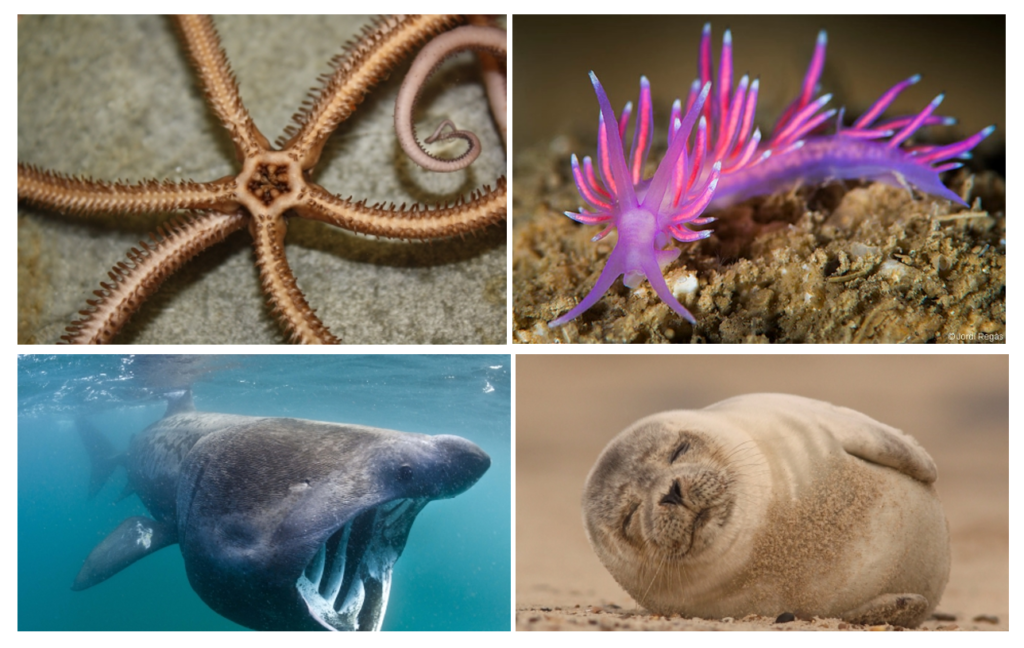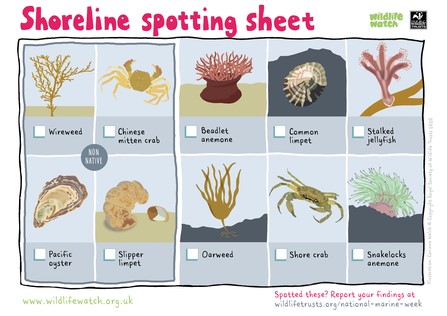National Marine Week was created as an opportunity to celebrate our seas, promote citizen science and improve relationships and understanding of this beautiful ecosystem. The seas surrounding the UK coastline are amazing. Home to a huge variety of organisms from brittle stars and nudibranchs to basking sharks and harbour seals. Not only are our seas an essential habitat for these organisms, they are also an essential resource to our economy through shipping, oil and gas production, fishing and aquaculture. Simply put, without our seas, life couldn’t exist. Despite this fact and that these combined industries have a gross value of £47 billion, we have continued to destroy habitats, overfish and cause vast amounts of environmental damage to them.

If that alone isn’t enough to have you reaching for a reusable straw or a litter picker then please read some of the statements below:
- Oceans hold 80% of earth’s biodiversity and they are the largest ecosystem on earth
- Fisheries and the aquaculture industry employs 12% of the global population
- Over half of earth’s oxygen is produced in the ocean by photosynthetic phytoplankton
To recognise the importance of these marine and coastal ecosystems the UK government passed the UK Marine and Coastal Access Act in 2009 to introduce cohesive marine management in the UK and introduce a new marine protected area designation – the Marine Conservation Zones (MCZ). The UK now has 355 Marine Protected Areas (MPAs) of different types and these zones cover 220,000 sq km – nearly twice the size of England!
However, the effectiveness of these MPAs has been put under scrutiny as they are not routinely enforced or monitored and the implementation of MPAs is handled differently across UK governments. Several organizations such as the Marine Conservation Society (MCS), National Wildlife Trust (NWT) and the World Wildlife Fund (WWF) all have objectives pertaining to MPAs in UK waters. To address these objectives, some of the projects under the QUADRAT studentship were created with the aim to enact change on a policy level. For example, generating an interpretive model for the impacts of ground water on climate change, assessing harmful algal bloom occurrence to mitigate their impacts on aquaculture and investigating MPA governance across the UK specifically looking at integrating a Natural Capital Approach.
How can you get involved?
Anyone, at any age from any background can become involved, please see below for some ideas:
- Reduce your carbon footprint
By remembering simple things such as switching off lights when you leave the room, turning off electronics or walking to work rather than driving, you could reduce your footprint drastically. In instances where you can’t reduce your footprint you can try to offset it instead. This handy calculator can show you how.
- Choose sustainable seafood sources or have fish-free days
Global stocks of popular fish species have been severely overfished and are diminishing rapidly due to increased demand and unsustainable fishing practices. By choosing sustainable sources you will be contributing to the sustainability of the fishing industry. You can check out the “Good fish guide” by the Marine Conservation Society to get more info. Additionally, if you fancy taking a “dive” into fish-free Fridays, the BBC Good Food website has some great vegetarian recipes.
- Reduce your use of plastic products
8 million metric tonnes of plastic enters the marine environment each year and has been found in organisms ranging from microscopic plankton to blue whales. You can reduce this by swapping plastic products for sustainable choices such as metal straws or bamboo toothbrushes. If you can’t swap something, try to recycle. You can contact your local authority if you are unsure where your nearest recycling centre is. Check out the #PassOnPlastic campaign for inspiration!
- Sign petitions
If you can’t get out and about there are plenty of petitions that could use signatures to progress further and reach parliament. A good place to start is the UK government’s website, then search for terms such as “Marine” or “Fishing”.
- Attend beach cleans
Want to get down and dirty? Then attend a beach clean! It might be a little nippy but the sense of achievement you feel at the end is worth it and the local creatures will thank you. The Marine Conservation Society is good place to find local beach cleans, if you can’t find one then you can organise your own. There is also the annual Great British Beach Clean in September which happens up and down the country!
- Become a citizen scientist
If you have a little time on your hands, you can become a citizen scientist! Many research projects would not be able to take place without the assistance of amazing volunteers. There are many projects that need help, one example is the Wildlife Trust Wildlife watch, fill in the sheet and tell them what you’ve spotted on your walk – simple!

- Attend talks
Have you found something you are particularly interested in such as seal behaviour or beach foraging? Attend a talk by an expert, most of the time they are free, you will meet like-minded people, some are even available online (so you can attend in your pyjamas!) and you’ll learn something new. There are many of places you can find these events such as Eventbrite and the Wildlife Trust.
- Tell your friends
Drag a friend along to any event or beach clean you go to, standing on a beach on a cold windy is infinitely more fun if you have company. This also applies to petitions and reducing your carbon footprint, you could have a competition of who’s footprint is smaller!
Some of the easiest smallest changes make a BIG difference especially when more people are involved!
Images courtesy of:
Common Brittle star (Ophiothrix fragilis): https://britishseafishing.co.uk/common-brittle-star/
Nudibranch (Edmunsella pedate): https://www.cibsub.cat/bioespecie-edmunsella_pedata-28172
Basking Shark (Cetorhinus maximus): https://www.wildlifetrusts.org/wildlife-explorer/marine/fish-sharks-skates-and-rays/basking-shark
Common/Harbour seals (Phoca vitulina): https://www.wildlifetrusts.org/wildlife-explorer/marine/marine-mammals-and-sea-turtles/common-seal
Shoreline spotting sheet: https://www.wildlifetrusts.org/national-marine-week-species-reporting





















































